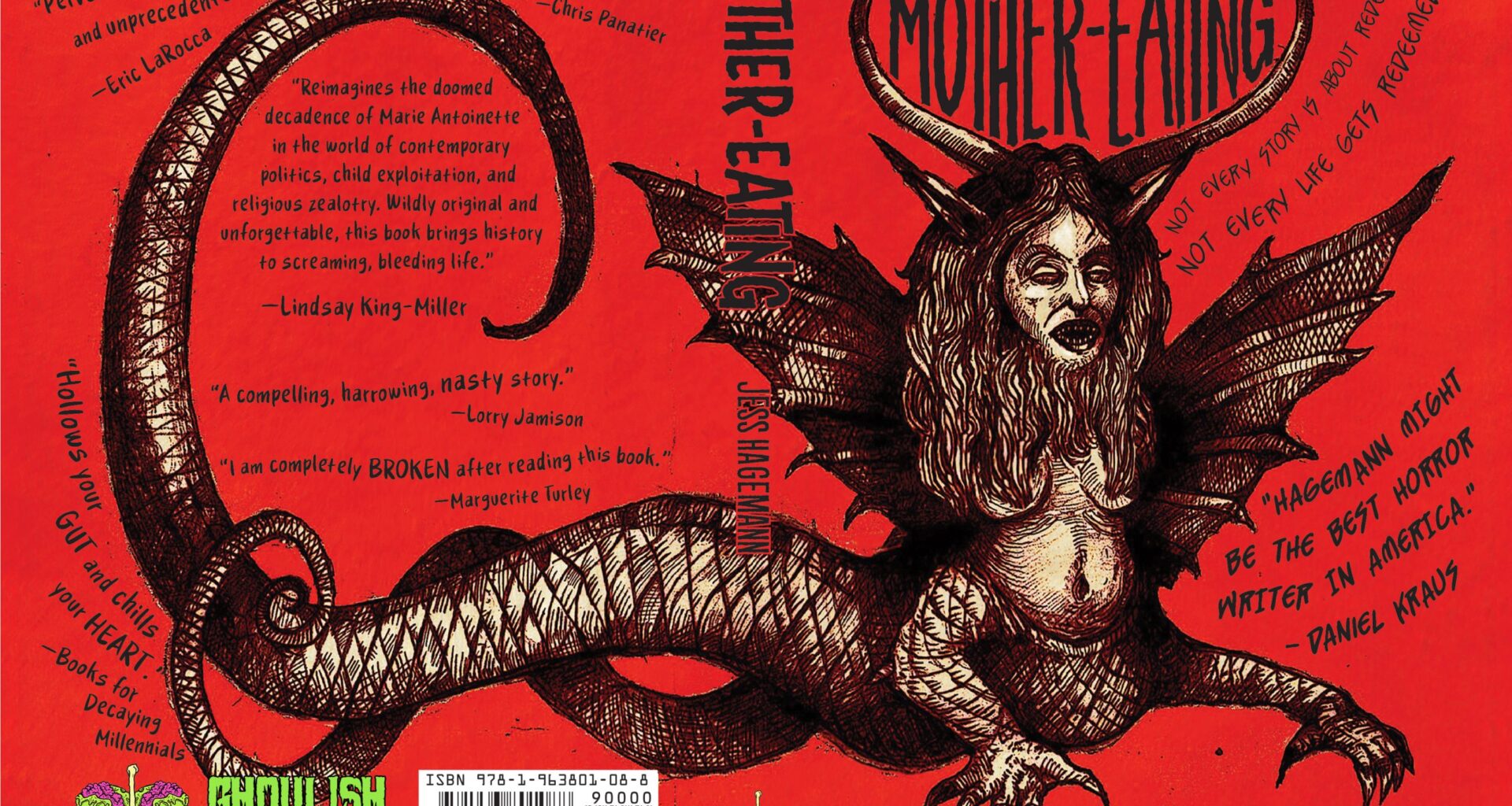The opening of Jess Hagemann’s sophomore novel Mother-Eating is not for the faint of heart. In the first scene, a man is captured, tortured, and sacrificed during a cult orgy. With that, the reader is thrown into a brutal, stomach-turning story that announces itself as horror without apology. For some, it will be too much; for others, it will be exactly the kind of fiction they crave. Either way, it is impossible to look away.
Hagemann lives in Austin and often finds inspiration in Texas. Already known for her horror writing, she’s carved out a niche that embraces the disturbing and the grotesque. With Mother-Eating, she takes those strengths and applies them to a modern retelling of Marie Antoinette’s downfall, reimagined in Austin as a “pseudo-religious, torture-happy sex cult.”
The novel follows Mary Toni, who is sold by her neglectful, opioid-addicted mother to King Louis, the leader of a growing church called Simon’s Sorrow, in exchange for a TV contract. The story unfolds in familiar locations like the UT campus, Speedway, and Sixth Street, painting the picture of an alternate reality. The novel is told in a documentary style through anecdotes, testimonies, and memories that gradually build a clear portrait of Mary Toni and her reign as queen of the cult.
Jess Hagemann demonstrates both sick imagination and exquisite craft, delivering a story that is as horrifying as it is captivating.
One of the book’s most striking qualities is the careful precision Hagemann writes with. She paints vivid pictures without overwriting, utilizing sharp and deliberate vocabulary that elevates ordinary descriptions into something uncanny. Hagemann spares no descriptive effort in rendering torture, sex, and sacrificial rites. She capitalizes regular words like “Outside,” reinforcing how deeply the cult reframes the world for its members.
The novel dives into obsession, faith, and the terrifying ease with which people can be consumed by charismatic leaders. Hagemann not only shows the manipulation of the church but also the emotional hooks of loneliness and family neglect, a hunger for belonging that makes people susceptible to dangerous power dynamics. Readers can understand how easy it is to get roped in and why people choose to stay.
 Credit: Ghoulish Books
Credit: Ghoulish Books
But the Marie Antoinette parallels, while clever, feel heavy-handed. By using the names Mary Toni and King Louis outright, the book signals its intentions a little too loudly. The retelling might have been stronger if the references were subtler, allowing readers to piece it together themselves. Similarly, the number of plot points – the modern retelling of Marie Antoinette, the Austin setting, cult dynamics, a TV contract subplot, and its documentary form – feel overwhelming at first. Despite this, the storylines are woven into the novel cohesively.
As the story progresses, the rise and eventual collapse of Simon’s Sorrow mirrors the trajectory of King Louis and Mary Toni’s relationship. At its height, the cult has hundreds of members, an heir to the throne, and hopes of the reincarnation of Simon. From within, however, jealousy, suspicion, and disillusion begin to destroy it. What once promised salvation ends in implosion.
In the end, Mother-Eating is gruesome, ambitious, and meticulously written. It is not an easy book to read, nor is it meant to be. Jess Hagemann demonstrates both sick imagination and exquisite craft, delivering a story that is as horrifying as it is captivating. Watching the church unravel from the inside, and King Louis’ reign crumble, provides a brutal yet fitting close. The book may not be for everyone, but it is undeniably unlike anything else on the shelf.
Jess Hagemann speaks at Birdhouse Books on Oct. 30 and appears at the Texas Book Festival Lit Crawl “Creeps and Geeks” event at Speakeasy on Nov. 8.
Mother-Eating
By Jess Hagemann
Ghoulish Books
This article appears in October 31 • 2025.
A note to readers: Bold and uncensored, The Austin Chronicle has been Austin’s independent news source for over 40 years, expressing the community’s political and environmental concerns and supporting its active cultural scene. Now more than ever, we need your support to continue supplying Austin with independent, free press. If real news is important to you, please consider making a donation of $5, $10 or whatever you can afford, to help keep our journalism on stands.

